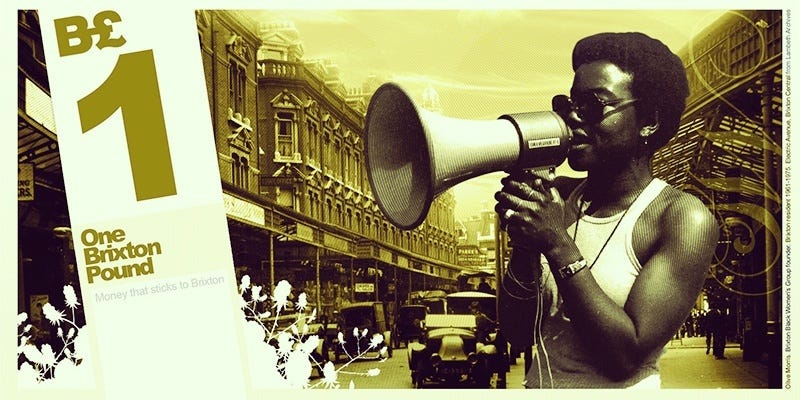
One Brixton Pound, a local currency issued in Brixton, a district of South London.
When I start talking about alternative currencies, I realize that most people only have in mind the BitCoin experiment and underestimate the (r)evolution already created by all the other community currencies. The number of alternative currencies operating is growing exponentially: 2 experiments took off in 1984 and today there are 5,000 mature systems. Here is a selection of great examples that I hope will reshape the way you see what money is and what money does.
#1. BERKSHARE in Massachusetts, USA
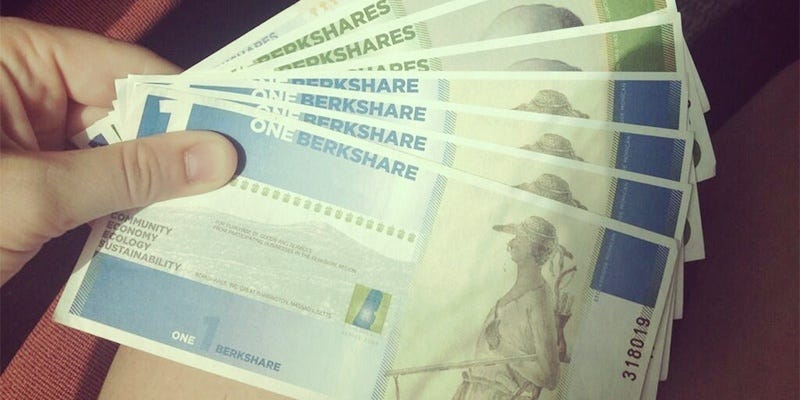
The BerkShare is issued in the Berkshire County located in Massachusetts, USA. Launched in the fall of 2006, it is probably the most successful experiments of local currencies.
Locals can exchange 95 US Dollars for 100 BerkShares at seven branch offices of four local banks. The alternative currency can be spent at 1 USD for 1 BerkShare within the network of 400 locally owned participating businesses (getting in return a 5% discount incentive for each product or service purchased within that network).
The circulation of BerkShares encourages capital to remain within the region, building a greater affinity between the local business community and its citizens. The people who choose to use the currency make a conscious commitment to buy local and in doing so take a personal interest in the health and well-being of their community by laying the foundations for a truly vibrant, thriving economy.
BerkShares are issued by a non-profit organization that works in collaboration with participating local banks, local businesses and local non-profit organizations to strengthen the Berkshire regional economy through the local currency program. It envisions a diverse and resilient regional economy that supports and prioritizes responsible production and consumption wherein community members rely on the land and each other to fulfill the basic needs of food, culture, clothing, shelter and energy.
The BerkShare initiative is part of the Transition Towns movement that started in the UK in 2006 and rapidly expanded to the US; this is a project that aims at creating stronger, happier communities and seeks to build resilience in response to peak oil, climate destruction, and economic instability
⇒ Complementary reading: “A Day in the Life of a BerkShare”
#2. FUREAI KIPPU in Japan
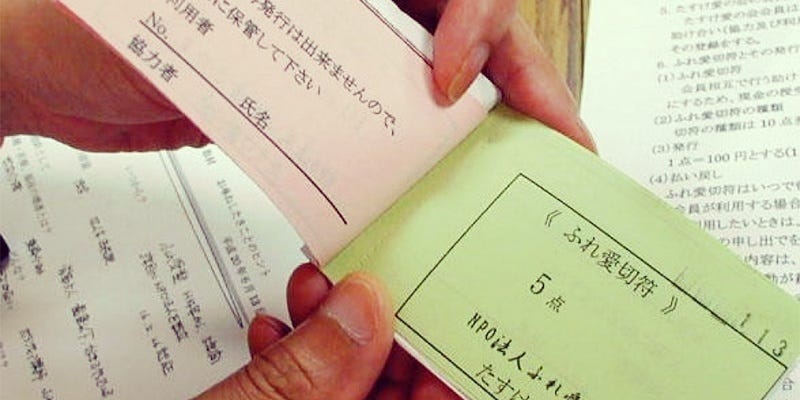
The “Fureai Kippu” (“Caring Relationship Tickets” in Japanese) is a time-based cooperative currency created in 1995 and whose goal is to promote care and service to the elderly.
These “tickets” are paid to individuals who choose to help the elderly with areas that the Japanese national healthcare system doesn’t cover such as helping with food preparation in their own homes or helping with the daily bath (a ritual in Japan) so that they can remain in their houses longer instead of having to be put in retirement homes. The caregivers in turn may use these credits when they are ill to get assistance from other caregivers or they may elect to transfer their Fureai Kippu credits to parents or relatives who need help.
This complementary currency gave room for the creation of a powerful personal care service without raising taxes or diverting funds from other programs run in conventional Yen currency. In addition, the elderly prefer the services offered by these caregivers to those paid in Yen: The relationship is different, it is more personal on both sides.
⇒ Complementary reading: Fureai Kippu — Compassion is the new currency
#3. BUS TOKEN in Curitiba, Brazil
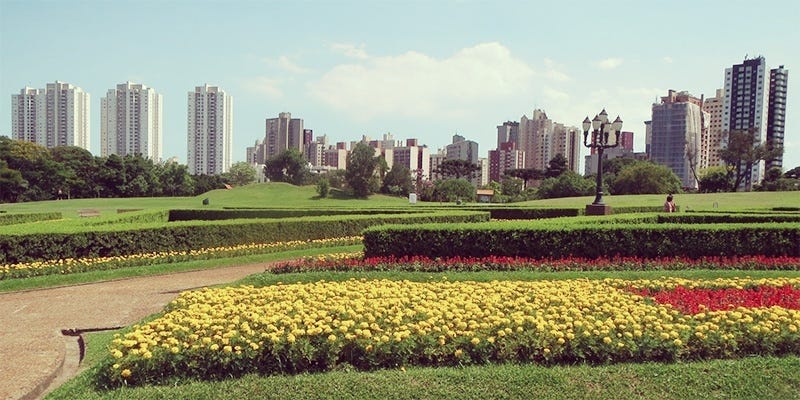
Trash used to be a nightmare in the favelas of Curitiba. Trucks couldn’t get there because the pathways were too narrow and the terrain was very hilly; the city simply did not have the funds to deal with the crisis. However, locals realized that two resources were widely available:
Large metallic bins were placed in the streets at the edge of the favela neighborhoods and those who collected and sorted out the trash were given tokens to ride the local bus system. People made use of the tokens to travel downtown, often to find work.The bus tokens were soon accepted at local markets in exchange for food.
The 62 poorer neighborhoods alone exchanged 11,000 tons of garbage for nearly a million bus tokens and 1,200 tons of food. In one three-year period, more than 100 schools traded 200 tons of garbage for 1.9 million notebooks. The paper-recycling component alone saved the equivalent of 1,200 trees each day! 60 to 70 percent of Curitiba’s trash is recycled in situ, possibly the highest percentage in the world. The results in human terms — in the renewal of dignity and hope for a better future — are incalculable.
Other programs were created to finance the restoration of historical buildings, create green areas, provide housing, all financed by the complementary currency system. More than 70% of Curitiban households became involved in the various programs.
⇒ Complementary reading: The Story of Curitiba in Brazil
#4. TOREKES in Ghent, Belgium
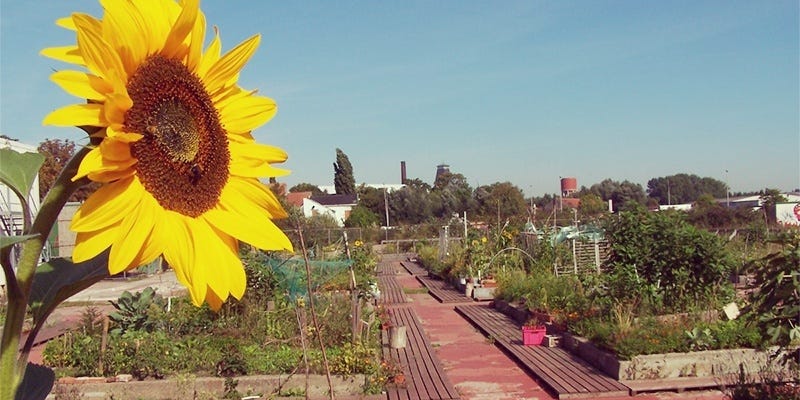
Rabot is an immigrant district in Ghent, Belgium. It used to be the poorest community in the entire region where most of the population lives in low-income apartment buildings in one of the most densely populated localities in Europe. Rabot suffered from high unemployment and the usual symptoms of urban decay.
Surveys were conducted to find out what residents wanted for themselves and their lives. Many locals wanted to have access to a few square yards of land for gardening, growing vegetables and flowers and the city happened to own abandoned land in the neighborhood that was divided into plots measuring 4 square meters each. These plots became available to rent on an annual basis at the cost of 150 “Torekes”, a local currency created for that project.
To earn Torekes, a long list of urban agricultural improvements and beautification activities could be done. Participants were rewarded for activities such as putting flower boxes on the windowsills facing the street, planting and maintaining sidewalk flower containers, placing “no advertising” labels on mailboxes to reduce junk mail and helping to clean up the neighborhood’s sports field after a game.
Arrangements were also made with local shops to accept Torekes for specific goods that the city wanted to promote: low-energy lamps, green products and fresh seasonal vegetables. Torekes can also be exchanged for public transport tickets and seats for cultural events or movies.
⇒ Official website: Welkom bij Torekes!
#5. TIME BANKING in Blaengarw, Wales
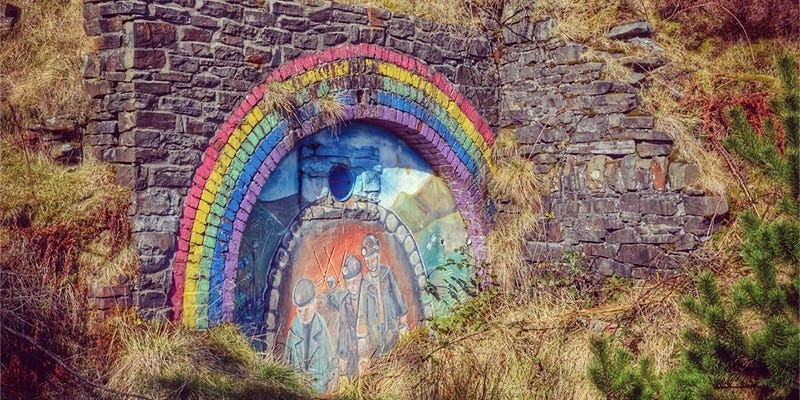
Blaengarw was a mining village of less than two thousands souls in South Wales trapped in a postindustrial depression. 80% of the local population was previously involved in mining in some fashion so when the industry collapsed, unemployment skyrocketed and the town ranked 128th on the scale of 1,800 communities on the Welsh index of material deprivation (statistics are based on things such as antisocial behavior, crime and unemployment).
A regional and local NGOs worked together to launch a time-banking currency: For each hour of service given, a credit of one hour is exchanged. For example, people learn to cook healthy meals in the community food studio and serve it at the café (which prides itself on offering grown locally food in the community and individual gardens). Entry to events can be paid in time money: A two-hour bingo night or movie costs two time credits and a three-hour cultural performance is valued at three time credits.
Over 1,000 participants now contribute each year to 60,000 hours of service to their community, but beside the economic benefits, people interact in new ways, creating stronger ties among each other and their community. Thus, the project helped lower crime rates, antisocial behavior and the general down-and-out demeanor.
⇒ Complementary reading: Blaengarw Time Centre
#6. The BONUS for emergency situations
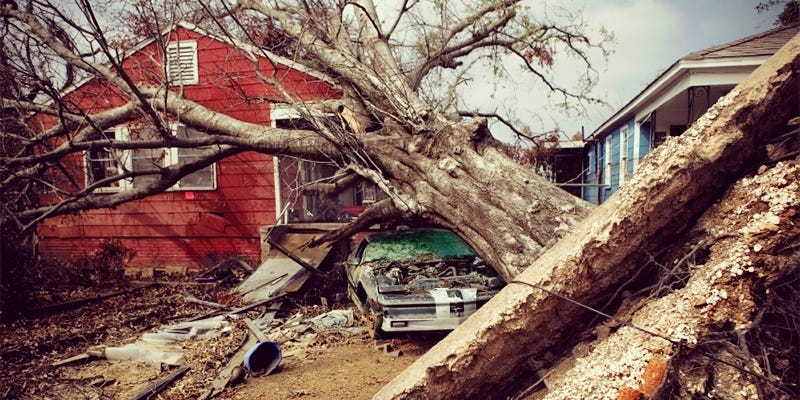
The BONUS is an emergency cooperative currency created by the Social TRade Organization (STRO) whose mission is to help local/regional economies flourish in a sustainable way.
Usually, with typical disaster relief programs, funds flow from donors to the local NGOs and eventually into the hands of individuals and businesses. However, goods and services are inevitably purchased from nonlocal sources, reversing the flow of money back out of the community. Eventually, almost all of the money leaves the area, abandoning the local community.
The BONUS works as a local voucher with a small demurrage fee to promote its continuing circulation. It is designed to maximize the efficacy and productivity of relief funds by encouraging money to remain in the local economy, something that is essential for recovery. In this system, national money is used for resources that absolutely must be purchased from outside suppliers but everything else is purchased in the local currency within the community.
⇒ Official website: Social TRade Organisation (STRO)
To complement the national and supra-national currencies we already know, we will probably use in a few decades:
The time outlay to set up an alternative currency project is significant; it takes about 3 to 5 years until you get into the zone where the whole operation can be self-financing. People who get involved with currency projects do so because they truly believe in it and are committed to creating a substantial change that will positively impact our societies and the way we view and use money. If you also feel motivated in getting involved within a currency project, feel free to send me a personal message. Glad to hear more about your convictions and brainstorm on how to collaborate on a complementary currency initiative.
In any case, you can keep receiving fresh insights about alternative currencies by simply joining my list of newsletter subscribers.
Looking forward to hearing from you.
Note: The piece of writing has been inspired by the examples shared by Bernard Lietaer in his book “Rethinking Money” that I strongly recommend.
To learn more, please visit: 6 Examples Of Complementary Currencies That Will Change Your Vision Of Money




